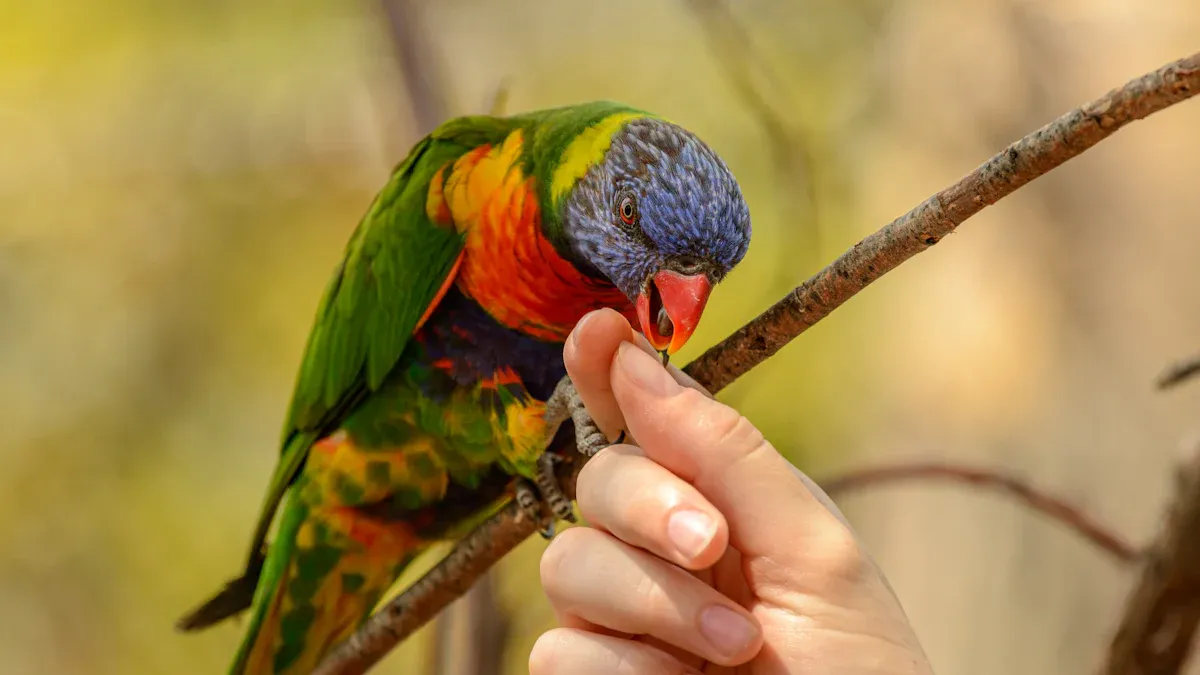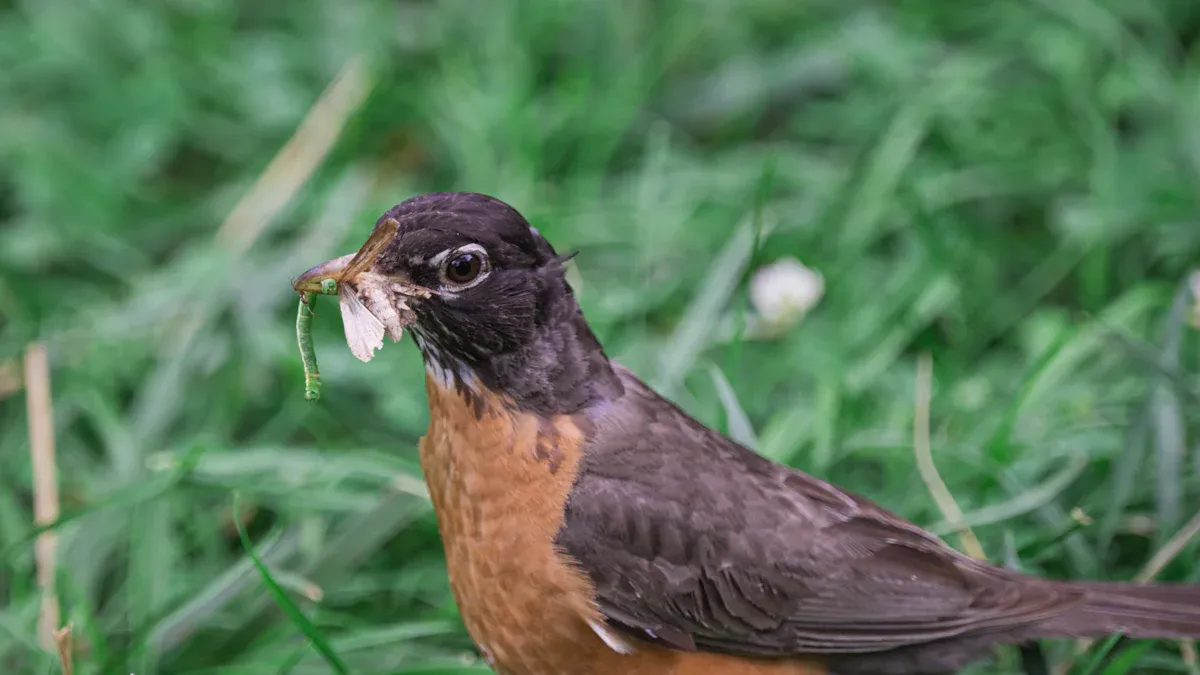
Birds love a tasty treat, and mealworms fit the bill perfectly! These little powerhouses pack a punch with essential nutrients. Parrots, in particular, can thrive on bird feed mealworms, enjoying improved health and vitality. With their high protein, vitamins, and minerals, mealworms can transform any parrot’s diet into a feast of nutrition.
Key Takeaways
- Mealworms are a nutritious treat for parrots, packed with high protein, essential vitamins, and minerals that support overall health.
- Introduce mealworms gradually into your parrot’s diet, offering them as occasional treats to avoid overfeeding and maintain a balanced diet.
- Mix mealworms with other foods like fruits and seeds to enhance their nutritional value and make meals more exciting for your parrot.
Avantages nutritionnels des vers de farine d'alimentation des oiseaux
Bird feed mealworms are not just a tasty treat; they are a nutritional powerhouse for parrots! Let’s dive into the specific benefits that make these little critters a fantastic addition to your feathered friend’s diet.
High Protein Content
Mealworms boast an impressive protein content, ranging from 27% to 54%. This makes them a superior choice compared to other common protein sources. For instance, soybean meal has lower crude protein content. Mealworms provide nearly 50% protein by dry weight, which is essential for muscle development in parrots. This protein aids in tissue repair and enhances muscle strength. Plus, over 90% of the amino acids in mealworms are digestible, ensuring that parrots can effectively utilize these nutrients.
Essential Vitamins
Bird feed mealworms are rich in essential vitamins, particularly B vitamins like B12 and B2. These vitamins play a crucial role in energy metabolism, helping parrots stay active and vibrant. By incorporating mealworms into their diet, parrots can enjoy a boost in energy levels, making them more playful and lively.
Important Minerals
Mealworms are not just about protein and vitamins; they also contain vital minerals that support overall health. Here’s a quick look at some of the important minerals found in bird feed mealworms:
| Mineral | Avantages pour la santé |
|---|---|
| Iron | Essential for oxygen transport and energy production |
| Calcium | Important for bone health and muscle function |
| Potassium | Supports heart and muscle function |
| Magnesium | Aids in muscle and nerve function |
These minerals play crucial roles in various bodily functions. For example, iron supports oxygen transport, while calcium is vital for strong bones. Potassium helps maintain proper heart function, and magnesium is essential for nerve and muscle function. By adding bird feed mealworms to their diet, parrots can benefit from these essential nutrients, promoting better overall health.
How to Incorporate Bird Feed Mealworms

Incorporating bird feed mealworms into a parrot’s diet can be a delightful experience for both the bird and its owner. However, it’s essential to follow some guidelines to ensure that these nutritious treats benefit your feathered friend without causing any issues.
Lignes directrices pour l'alimentation animale
When introducing mealworms to a parrot’s diet, moderation is key. Here are some suggested guidelines to keep in mind:
- Offer mealworms as occasional treats, not daily staples.
- For smaller parrots like budgies, provide 1-2 verres de farine two to three times a week.
- Always avoid overfeeding due to the high-fat content of mealworms.
Following these guidelines helps maintain a balanced diet while allowing parrots to enjoy the benefits of these tasty treats.
Tailles de service recommandées
Serving sizes can vary based on the size and species of the parrot. Here’s a quick reference for different types of parrots:
| Parrot Species | Recommended Serving Size |
|---|---|
| Budgies | 1-2 mealworms, 2-3 times a week |
| Cockatiels | 2-3 mealworms, 2-3 times a week |
| Conures | 3-5 mealworms, 2-3 times a week |
| Larger Parrots | 5-10 mealworms, 2-3 times a week |
Adjusting serving sizes according to the parrot’s size ensures they receive the right amount of nutrition without excess fat.
Mixing with Other Foods
Mixing bird feed mealworms with other foods can enhance their nutritional value and make meals more exciting. Here are some effective combinations:
- Pair mealworms with sunflower hearts for healthy fats.
- Add them to suet cakes or balls for an energy boost.
- Combine with fresh fruit for a vitamin-rich treat.
- Mix in black sunflower seeds for extra protein.
- Include peanuts for an additional energy source.
To serve mealworms effectively, consider these methods:
- Scatter them on the ground for foraging fun.
- Use a dedicated mealworm feeder to keep things tidy.
- Blend them into suet cakes or balls for a nutritious snack.
- Mix with bird seed for a balanced meal.
- Place them on a window feeder to attract curious birds.
Combining mealworms with fruits or seeds can enhance gut health and improve nutrient absorption. A varied diet, including mealworms, seeds, and fruits, is essential for providing all necessary nutrients for a parrot’s health.
Potential Risks of Bird Feed Mealworms
While bird feed mealworms offer numerous benefits, they also come with potential risks that every parrot owner should consider. Understanding these risks can help ensure a safe and healthy diet for your feathered friend.
Allergies in Parrots
Just like humans, parrots can develop allergies. Some birds may react negatively to mealworms. Symptoms can include itching, feather plucking, or digestive issues. If a parrot shows any unusual behavior after eating mealworms, it’s wise to consult a veterinarian. Always introduce new foods gradually to monitor for any adverse reactions.
Risques de suralimentation
Overfeeding mealworms can lead to health problems. These protein-rich treats should not replace a parrot’s main diet. Here’s a quick look at the risks associated with overfeeding:
| Evidence | Description |
|---|---|
| Overfeeding protein-rich treats | Can lead to health problems. Owners should monitor their parrot’s weight and adjust treat portions accordingly. |
| Overfeeding mealworms | Can result in health issues. Treats should not replace the main diet. |
| Moderation in offering mealworms | Important to provide them in moderation as part of a balanced diet to prevent health risks. |
Keeping mealworms as an occasional treat helps maintain a balanced diet and prevents unwanted weight gain.
Sourcing Safe Mealworms
When sourcing mealworms, safety is paramount. Here are some tips to ensure you choose the right ones:
- Mealworms can carry food poisoning bacteria, similar to other food products.
- The risk of harmful bacteria increases if mealworms are air-dried instead of roasted or fried.
- Always source mealworms from reputable suppliers approved by the EU.
Additionally, mealworms raised improperly may contain harmful substances. Poor feeding practices can introduce plastics and pesticides into the mealworms. Always opt for high-quality sources to keep your parrot safe and healthy.
Overall Impact on Parrot Health with Bird Feed Mealworms
Improved Energy Levels
Bird feed mealworms can give parrots a significant energy boost. The high protein content fuels their playful antics and keeps them active throughout the day. Parrots thrive on energy, especially during playtime or when exploring their environment. With mealworms in their diet, they can enjoy longer periods of activity, making them happier and healthier.
Enhanced Feather Quality
Mealworms play a vital role in enhancing feather quality. These little critters are packed with protein, boasting an impressive 52.8% content. This protein is essential for feather growth and repair. Regular consumption of dried mealworms leads to smoother, more vibrant feathers. Parrots benefit from essential fatty acids, which support healthy skin and coat. Additionally, minerals like iron, calcium, magnesium, and zinc contribute to overall health.
- Regular mealworm consumption enhances feather quality.
- Protein is crucial for feather growth, especially during molting.
- Vitamins like B12 and minerals such as zinc improve feather smoothness and vibrancy.
Better Digestive Health
Mealworms also promote better digestive health in parrots. They positively influence gut microbiota diversity, which is essential for a healthy digestive system. A diet rich in mealworms increases the abundance of beneficial bacteria, such as Rombutisia and Akkermansia. These bacteria aid in protein metabolism and contribute to a more uniform microbial community in the gut.
| Evidence Description | Key Findings |
|---|---|
| Mealworm diet impact on gut microbiota | Increased abundance of Rombutisia and Akkermansia, linked to protein metabolism. |
| Variation in gut microbiomes | Lower individual variation in microbiomes with mealworm diet compared to seed diet, indicating a more uniform microbial community. |
| Dominance of bacterial phyla | Firmicutes dominated the gut microbiota (97.5%) in mealworm diet, showing significant dietary influence. |
| Microbial resilience | Gut communities showed partial resilience to dietary changes, suggesting adaptability to insectivorous diets. |
Incorporating bird feed mealworms into a parrot’s diet can lead to improved energy levels, enhanced feather quality, and better digestive health. These benefits make mealworms a valuable addition to any parrot’s nutrition plan.
Mealworms can transform a parrot’s diet into a nutritional delight! These protein-packed treats not only enhance energy levels but also support feather quality and digestive health. A study from the University of Arkansas highlights that high-protein diets help birds fight infections. 🦜
| Acide aminé essentiel | Content in Mealworms (g/kg, as-is basis) |
|---|---|
| Lysine | 10.7 |
| Méthionine | 2.55 |
| Thréonine | 7.57 |
| Valine | 12.8 |
| Isoleucine | 8.35 |
| Leucine | 14.0 |
| Phenylalanine | 6.54 |
| Histidine | 5.59 |
| Arginine | 13.8 |
| Tryptophane | 2.16 |
Incorporating mealworms into their diet can lead to happier, healthier parrots! 🌟
FAQ
À quelle fréquence dois-je nourrir des vers de farine à mon perroquet?
Feed mealworms as occasional treats, about 2-3 times a week, depending on your parrot’s size.
Tous les perroquets peuvent-ils manger des vers de farine?
Most parrots can enjoy mealworms, but always monitor for allergies or digestive issues.
Where can I buy safe mealworms for my parrot?
Purchase mealworms from reputable suppliers to ensure quality and safety for your feathered friend. 🦜


